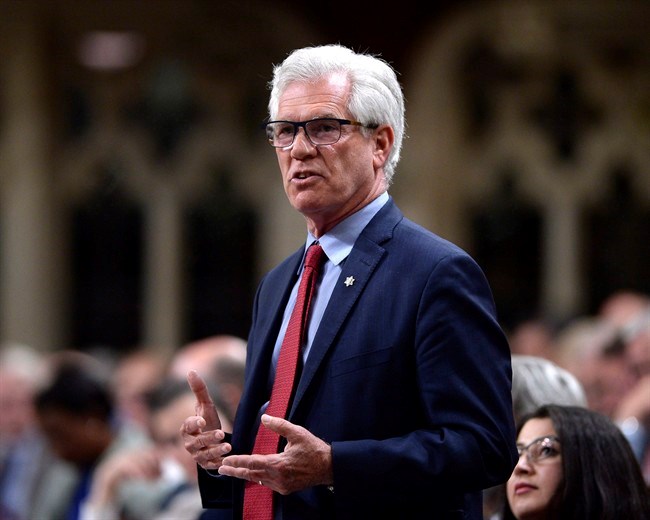 Minister of Natural Resources Jim Carr rises during Question Period in the House of Commons on Parliament Hill in Ottawa on Tuesday, May 29, 2018. Natural Resources Minister Jim Carr says Canada’s pathway to a clean energy future includes not only transitioning to renewable sources of energy but also technology that makes traditional fossil fuels cleaner to both produce and burn. THE CANADIAN PRESS/Justin Tang
Minister of Natural Resources Jim Carr rises during Question Period in the House of Commons on Parliament Hill in Ottawa on Tuesday, May 29, 2018. Natural Resources Minister Jim Carr says Canada’s pathway to a clean energy future includes not only transitioning to renewable sources of energy but also technology that makes traditional fossil fuels cleaner to both produce and burn. THE CANADIAN PRESS/Justin Tang
Natural Resources Minister Jim Carr says Canada's pathway to a clean energy future includes not only transitioning to renewable sources of energy but also technology that makes traditional fossil fuels cleaner to both produce and burn.
That path is laid out in a new report today which points not only to developing more wind and solar power, but also to the environmental and economic benefits of Canada producing, shipping and burning oil and natural gas that is cleaner and more cost efficient.
The two tracks are the main advice in the report from Carr's generation energy advisory council, a group of 14 people from the energy sector, indigenous communities and environmental groups.
The minister says oil and gas will be part of the energy mix for a long time and Canada's long-term goal is to become the world's cleanest producer of liquefied natural gas, which can then displace dirtier sources of electricity around the world.
Carr says the report's advice is closely aligned with a recent consensus reached by G20 energy ministers on how to move the world off the dirtiest sources of energy and will form the basis of Canada's national energy strategy which will be developed more fully in August during a federal-provincial energy ministers meeting.
Greenpeace Canada, however, is concerned that the report was developed largely by the fossil fuel industry and is not going to move the needle away from oil and gas very much.


